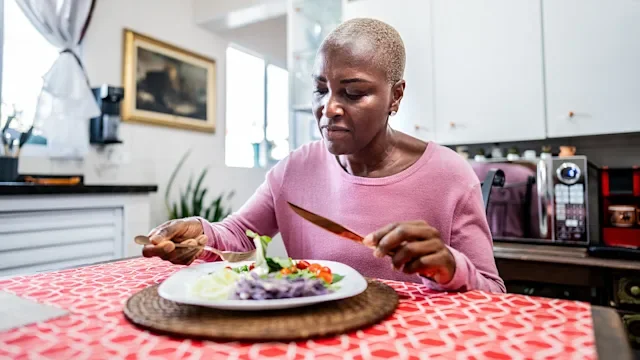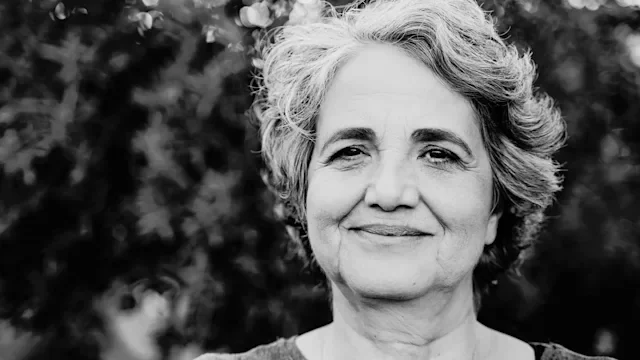Key takeaways:
A miscarriage is when a pregnancy ends unexpectedly, typically within the first 20 weeks of gestation.
Miscarriages are common. About 1 in 10 pregnancies end in a miscarriage.
Those who have experienced a miscarriage say the symptoms include bleeding and cramping — and a lot of emotions.
Pregnancy loss at any stage can be a difficult and emotional experience. A miscarriage is typically defined as the loss of a pregnancy before the 20-week mark. After the 20th week of pregnancy, a loss is typically classified as a stillbirth.
Below, three women share their experiences with miscarriage.
‘I really thought it could never happen to me’
Ashley Altschuld, a 34-year-old, stay-at-home mom in Linthicum, Maryland, knows about the emotional trauma of having a miscarriage. When she was around 5 weeks pregnant with her second child, she started to notice something concerning.
“I started spotting, and it was really heavy,” Ashley says. But the idea of a miscarriage was so far from her mind.
“I knew that people had miscarriages and that people lost babies. But, in my mind, that was something that happened to other people, not to me,” she says. “I really thought it could never happen to me.”
Ashley called her doctor to report the bleeding and went in for an ultrasound. At the appointment, her care team could see the egg sac, but they were having trouble finding a heartbeat. They decided to do some blood work to confirm. And then she left the office, feeling devastated. “I thought I was losing my baby,” she says.
The next day, Ashley got a phone call about her results and learned that the blood test indicated she was definitely pregnant. She asked about the bleeding and was told it was pretty common. At her next appointment, however, her doctor once again said that the bleeding was likely going to result in a miscarriage.
“We spent about 2 weeks going back and forth between ‘Oh, you’re pregnant’ and ‘Oh, no, you’re definitely miscarrying,’” Ashley says. “Those 2 weeks were some of the hardest stuff that I have ever been through.”
More testing revealed the pregnancy was not viable and that Ashely was experiencing a miscarriage. Ashley’s body was not expelling the pregnancy on its own, so she had a choice to make. Her doctor could prescribe hormones to help her body miscarry naturally. Or they could perform a dilation and curettage, also known as a D&C, to make sure all of the tissue was removed from the uterus.
Read more like this
Explore these related articles, suggested for readers like you.
“After going through this up and down for about 3 weeks, I was at the point where I couldn’t handle it anymore,” Ashley says. “I needed a firm and final day where I could say, ‘OK, I’m closing this chapter.’ So we scheduled a D&C.”


Ashley recalls feeling conflicted on the day of the procedure: “Part of me still wanted the back and forth of, ‘Am I pregnant? Am I not pregnant?’ And another part of me felt relieved.”
Now a mother of three, Ashley says that, without a doubt, the most powerful emotions she felt were hopelessness and devastation.
“As a parent, you want to do everything possible for your children,” she says. “And when something happens to them that is beyond your control, it can be really destabilizing.”
Before there was loss, there was joy
Bri Thomas, a 32-year-old writer in Austin, Texas, recently experienced pregnancy loss after trying for a baby for nearly 4 years.
After an in vitro fertilization (IVF) cycle, she couldn’t wait for blood work and took an at-home test. When she saw the results, she wasted no time sharing the news with her husband. “After 4 years of seeing negative tests, I couldn’t believe that it was actually positive,” Bri says.
At the 6-week ultrasound, Bri got to hear her baby’s heartbeat for the first time. Around the same time, she and her husband shared the news with their family, who had been following their fertility journey.
But the week after they shared the news with their family, Bri experienced a miscarriage.
At her 8-week ultrasound at the fertility clinic, her care team could not detect a heartbeat. “That scared me,” Bri says. “I immediately started bawling.”
She went to her regular OB-GYN 2 days later for another ultrasound. Her provider could not detect a heartbeat at that appointment, either. But Bri was still trying to hold on to a shred of hope, so she had one final ultrasound at the fertility clinic. They confirmed her pregnancy loss.
Bri recalls feeling grief and guilt, but also gratitude for her family’s love and support. “So many people were following our journey, and I felt the guilt of letting people down,” she says. But “I wanted to share the news because, no matter what happened, I was pregnant. I wanted people to know that.”
After the final ultrasound, Bri began bleeding heavily.
“That night, I started spotting a little. The next morning, there was a lot more blood. I broke out in a sweat and thought I was going to pass out or throw up,” she says. “I collapsed on the bed and told my husband something was wrong.”
For the next 6 hours, Bri experienced heavy bleeding and a feeling of faintness.
“I already have really bad periods and cramps,” she says. “But I feel like this was pretty much like my body giving birth. I had no idea the pain was going to be that excruciating.”


After the physical pain went away, the emotional pain continued, Bri says.
“Every time I used the bathroom, it was kind of a reminder that this isn’t supposed to be happening,” she says. “I’m supposed to be pregnant right now.”
Emotionally and physically painful
For Virginia Cademartori, a 39-year-old public relations executive in New York City, the emotional pain of pregnancy loss still lingers.
She has had four pregnancies, which have all ended in miscarriage. Two ended very early, while the other two ended when she was a little further along. The earlier losses occurred at only 4 weeks’ gestation.
“Even if they were only 4 weeks, they were still painful — maybe not physically, but mentally,” Virginia says. “With those, I didn’t have any physical pain, but the mental damage was of course bigger than any physical pain I’ve felt.”


One of Virginia’s miscarriages occurred between 7 and 8 weeks, and she says that that one felt physically harder. She was at a scheduled checkup when her provider told her the distressing news. They said that the pregnancy no longer appeared to be progressing and to expect a heavy period.
Later that day, Virginia began bleeding. She experienced painful cramping and bled for nearly 8 days.
“It was so much cramping that I ended up going to the hospital,” Virginia says. “I’ve never had a child, but the pain felt like contractions. It was really painful, and I didn’t know what to do.”
She says she felt unprepared for the heaving bleeding and intense pain: “At a certain point, I began questioning, ‘How much blood do you need to lose before you die?’”
She didn’t stay long in the hospital. And eventually the bleeding stopped. But she says she wishes someone in healthcare had better prepared her for what to expect and how to handle the pain.
Her fourth miscarriage occurred at 10 weeks, after she had heard the heartbeat twice. Like with each experience, it was uniquely painful.
Although it hasn’t happened yet, Virginia says she still hopes to have a baby of her own one day. And she wants her story to help others feel less alone.
What does the doctor say?

Patricia Pinto-Garcia, MD, MPH
Medical Editor
Losing a pregnancy is incredibly difficult. It’s normal to experience a wide range of emotions as you work your way through your grief and loss. Some people don’t even realize they are pregnant until they start to miscarry, which adds a layer of shock to an already intense situation.
A miscarriage, according to the medical definition, is any pregnancy that ends unexpectedly before 20 weeks, exactly midway through a full-term pregnancy. After 20 weeks, the loss of a pregnancy is called a stillbirth, or intrauterine fetal demise. But that designation really doesn’t matter when it comes to processing the situation. That’s why so many prefer the term pregnancy loss.
Physically, your body changes rapidly during early pregnancy. Very early pregnancy loss — at 4 to 6 weeks — has very different effects on the body than pregnancy loss at 16 or 18 weeks. Bleeding and cramping are symptoms that everyone experiences with a miscarriage. But people who were further along in their pregnancy usually experience more intense symptoms that last longer. They may also need medical help in the form of medication or a procedure, like a D&C.
Although the physical recovery only takes a few weeks for most people, the emotional toll can last far longer. Pregnancy loss, no matter how early or late, is loss.
There are many in-person and online support groups for people who’ve experienced pregnancy loss. Connecting with a support system can help you process how you feel and your new normal.

Why trust our experts?




















